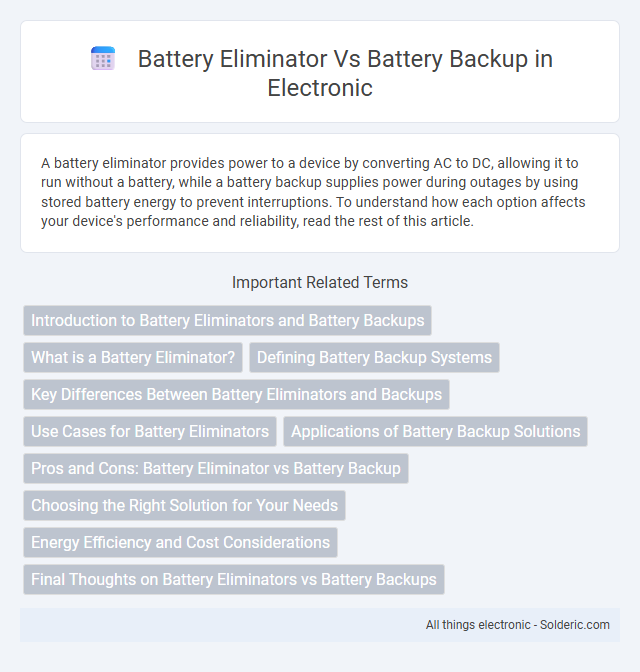A battery eliminator provides power to a device by converting AC to DC, allowing it to run without a battery, while a battery backup supplies power during outages by using stored battery energy to prevent interruptions. To understand how each option affects your device's performance and reliability, read the rest of this article.
Comparison Table
| Feature | Battery Eliminator | Battery Backup (UPS) |
|---|---|---|
| Primary Function | Replaces batteries by providing direct power from an external source | Provides temporary power during outages by using an internal battery |
| Power Source | Direct AC/DC power supply | Internal rechargeable battery |
| Use Case | Devices with constant power requirement without downtime concerns | Critical devices needing uninterrupted power during outages |
| Backup Duration | None | Minutes to hours depending on battery capacity |
| Cost | Generally lower | Higher due to battery and power management components |
| Maintenance | Minimal, mainly checks on power adapter | Battery replacement and regular testing required |
| Examples | AC adapters for cordless phones, remote controls | Uninterruptible power supplies for computers, medical equipment |
Introduction to Battery Eliminators and Battery Backups
Battery eliminators convert AC power into the specific DC voltage required by electronic devices, effectively replacing the need for disposable batteries and providing a consistent power source. Battery backups, often integrated with uninterruptible power supply (UPS) systems, store energy to provide temporary power during outages, ensuring continuous operation of connected equipment. Both solutions enhance device reliability, but battery eliminators offer steady power under normal conditions, while battery backups safeguard against power interruptions.
What is a Battery Eliminator?
A battery eliminator is a device designed to power electronic equipment by converting AC electrical current into the appropriate DC voltage, eliminating the need for batteries. It provides a continuous power supply, often used in applications such as radios, toys, and portable devices to replace disposable or rechargeable batteries. Unlike battery backups, battery eliminators do not store energy but rely on an external power source for operation.
Defining Battery Backup Systems
Battery backup systems are devices designed to provide uninterrupted power by supplying energy stored in batteries during outages, ensuring continuous operation of connected equipment. Unlike battery eliminators, which offer power conversion without energy storage, battery backups maintain power availability when the main source fails. These systems often include uninterruptible power supplies (UPS) critical for safeguarding sensitive electronics from data loss and hardware damage.
Key Differences Between Battery Eliminators and Backups
Battery eliminators supply a constant power source by converting AC to DC, allowing devices to run without internal batteries, while battery backups provide emergency power during outages, preserving your device's operation. The key difference is that battery eliminators replace batteries for regular use, whereas backups activate only when primary power fails, ensuring uninterrupted device functionality. Understanding these distinctions helps you choose the right solution to maintain power reliability based on your specific needs.
Use Cases for Battery Eliminators
Battery eliminators are primarily used in applications where a continuous power supply is required without the need for energy storage, such as powering portable radios, walkie-talkies, or other low-voltage electronic devices directly from AC outlets. These devices convert AC power to the necessary DC voltage, eliminating the need for disposable or rechargeable batteries, thereby reducing maintenance and operational costs. Ideal for stationary setups where consistent power access is available, battery eliminators enhance convenience and reliability in environments like workshops, laboratories, or communication stations.
Applications of Battery Backup Solutions
Battery backup solutions are essential in applications requiring uninterrupted power supply, such as data centers, medical equipment, and telecommunication systems. These solutions ensure critical devices remain operational during power outages, preventing data loss and system downtime. Industries relying on continuous power use battery backups to maintain productivity and safeguard sensitive operations.
Pros and Cons: Battery Eliminator vs Battery Backup
Battery eliminators provide a continuous power supply by converting AC to DC, eliminating the need for batteries, which reduces maintenance and environmental impact but depend on uninterrupted AC power, making them vulnerable during outages. Battery backups store energy in batteries to supply power during outages, ensuring device operation and data protection but require regular battery replacements and have limited runtime. Choosing between the two depends on application needs, with battery eliminators suited for stable environments and battery backups ideal for power-critical systems requiring surge protection and emergency power.
Choosing the Right Solution for Your Needs
Battery eliminators provide continuous power to electronic devices by converting AC to DC, ideal for applications with fixed power sources and no need for stored energy. Battery backups offer temporary power during outages, protecting your equipment from data loss and downtime by switching to stored battery power seamlessly. Understanding your power stability requirements and device sensitivity helps you choose the right solution, ensuring your system remains operational and secure.
Energy Efficiency and Cost Considerations
Battery eliminators reduce energy consumption by allowing devices to run directly from an AC power source, eliminating the inefficiencies of battery charging and discharging cycles, which lowers overall energy costs. Battery backups, while providing essential power continuity during outages, incur higher operational costs due to battery replacements and the energy required to keep batteries charged. Selecting a battery eliminator is more cost-effective for constant power needs, whereas battery backups are a necessary investment for critical systems requiring uninterrupted power.
Final Thoughts on Battery Eliminators vs Battery Backups
Battery eliminators provide continuous power by converting AC to the required DC voltage, ideal for devices needing constant energy without interruptions. Battery backups offer temporary power during outages, preventing data loss and system shutdowns, essential for critical electronics. Choosing between the two depends on whether seamless power supply or emergency power continuity is the priority.
battery eliminator vs battery backup Infographic

 solderic.com
solderic.com